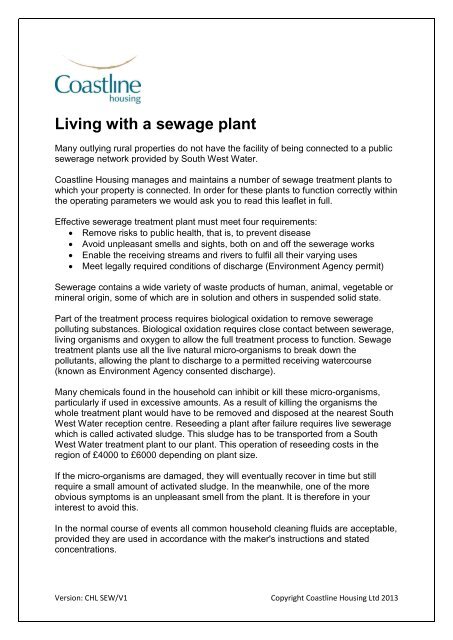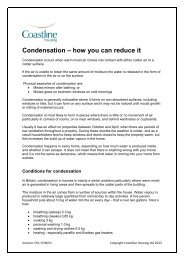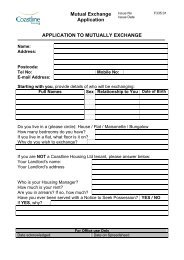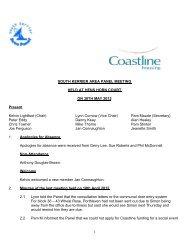Sewage plant leaflet - Coastline Housing
Sewage plant leaflet - Coastline Housing
Sewage plant leaflet - Coastline Housing
You also want an ePaper? Increase the reach of your titles
YUMPU automatically turns print PDFs into web optimized ePapers that Google loves.
Living with a sewage <strong>plant</strong><br />
Many outlying rural properties do not have the facility of being connected to a public<br />
sewerage network provided by South West Water.<br />
<strong>Coastline</strong> <strong>Housing</strong> manages and maintains a number of sewage treatment <strong>plant</strong>s to<br />
which your property is connected. In order for these <strong>plant</strong>s to function correctly within<br />
the operating parameters we would ask you to read this <strong>leaflet</strong> in full.<br />
Effective sewerage treatment <strong>plant</strong> must meet four requirements:<br />
• Remove risks to public health, that is, to prevent disease<br />
• Avoid unpleasant smells and sights, both on and off the sewerage works<br />
• Enable the receiving streams and rivers to fulfil all their varying uses<br />
• Meet legally required conditions of discharge (Environment Agency permit)<br />
Sewerage contains a wide variety of waste products of human, animal, vegetable or<br />
mineral origin, some of which are in solution and others in suspended solid state.<br />
Part of the treatment process requires biological oxidation to remove sewerage<br />
polluting substances. Biological oxidation requires close contact between sewerage,<br />
living organisms and oxygen to allow the full treatment process to function. <strong>Sewage</strong><br />
treatment <strong>plant</strong>s use all the live natural micro-organisms to break down the<br />
pollutants, allowing the <strong>plant</strong> to discharge to a permitted receiving watercourse<br />
(known as Environment Agency consented discharge).<br />
Many chemicals found in the household can inhibit or kill these micro-organisms,<br />
particularly if used in excessive amounts. As a result of killing the organisms the<br />
whole treatment <strong>plant</strong> would have to be removed and disposed at the nearest South<br />
West Water reception centre. Reseeding a <strong>plant</strong> after failure requires live sewerage<br />
which is called activated sludge. This sludge has to be transported from a South<br />
West Water treatment <strong>plant</strong> to our <strong>plant</strong>. This operation of reseeding costs in the<br />
region of £4000 to £6000 depending on <strong>plant</strong> size.<br />
If the micro-organisms are damaged, they will eventually recover in time but still<br />
require a small amount of activated sludge. In the meanwhile, one of the more<br />
obvious symptoms is an unpleasant smell from the <strong>plant</strong>. It is therefore in your<br />
interest to avoid this.<br />
In the normal course of events all common household cleaning fluids are acceptable,<br />
provided they are used in accordance with the maker's instructions and stated<br />
concentrations.<br />
Version: CHL SEW/V1 Copyright <strong>Coastline</strong> <strong>Housing</strong> Ltd 2013
Common chemicals<br />
Washing machine and dishwasher detergents - perfectly alright in normal<br />
concentrations and usage. Problems can occur if for instance you are washing the<br />
jerseys of the local rugby club.<br />
Floor cleaners, disinfectant and bleaches - again these are safe to use in<br />
accordance with the maker's recommendations. What you should refrain from doing<br />
is pouring neat disinfectant and bleach down the sink or outside gully. If these smell<br />
it is likely there is a build-up of decaying material or a plumbing problem that should<br />
be dealt with accordingly.<br />
Nappy disinfectant and bottle sterilizing fluids like Milton - when disposing the used<br />
fluid ensure that it is well diluted with water. The easiest way of doing this is to flush<br />
it away down the toilet.<br />
Drain and pipe cleaning solutions like Mr Muscle - these must not be used where a<br />
property is connected to a septic tank or treatment <strong>plant</strong>. One sachet is strong<br />
enough to kill all the bacteria in a <strong>plant</strong> that serves around 20 properties.<br />
Waste disposal units - these do not inhibit the micro-organisms but they can present<br />
the <strong>plant</strong> with a considerable extra load. It is much better and more environmentally<br />
friendly to compost your vegetable peelings.<br />
Home beer and wine making - this presents a similar problem to waste disposal<br />
units. A treatment <strong>plant</strong> works as hard to treat one pint of beer as it does to treat the<br />
normal waste of one person in 24 hours. Therefore when disposing ensure it is well<br />
diluted with water.<br />
Out of sight, out of mind<br />
The average family produces 600 litres of waste water a day, equivalent to eight<br />
dustbins.<br />
Here are the top ten harmful substances and items that must not be discharged to<br />
the drains:<br />
• Cooking oil and fat – bag and bin<br />
• Cotton buds, condoms and disposable contact lenses – bag and bin<br />
• Disposable razors and hypodermic needles – talk to Cornwall Council or your<br />
health care provider to arrange safe disposal of hypodermic needles<br />
• Disposable nappies, sanitary towels, backing strips, tampons and panty liners<br />
– bag and bin<br />
• Weed killers, insecticides, fungicides and other gardening chemicals - take to<br />
a local authority collection point<br />
• Wet wipes and facial wipes – bag and bin<br />
Version: CHL SEW/V1 Copyright <strong>Coastline</strong> <strong>Housing</strong> Ltd 2013
• Paint, thinners, white spirit, turpentine, creosote - take to a local authority<br />
collection point<br />
• Medicines - these should be taken to a pharmacist for disposal<br />
• Motor oil, grease, anti-freeze, brake fluid - take to a local authority collection<br />
point<br />
• Photographic developing fluids - take to a local authority collection point<br />
Non-organic waste<br />
<strong>Sewage</strong> <strong>plant</strong>s are designed to treat organic waste. Non-organic waste will cause<br />
harm to the <strong>plant</strong>, especially those that contain mechanical parts such as inlet<br />
screens and pumps.<br />
The foul drain leaving your house is only four inches in diameter. This is only<br />
designed for dirty water and human waste. Blockages are caused by sanitary towels,<br />
tampons, panty liners congealed cooking fat, cotton buds and condoms. Although<br />
such items do not directly damage the micro-organisms they can however cause<br />
problems such as blockages and damage to moving parts and unnecessary call outs<br />
to the <strong>plant</strong>. Even so-called disposable nappies and sanitary towels often do not<br />
degrade fully in the treatment <strong>plant</strong> and can lead to malfunctions, and then need to<br />
be disposed of by other means.<br />
Please remember that the costs of running the sewage <strong>plant</strong>s are shared equally<br />
between the all the connected properties, and breakdowns caused by the<br />
inappropriate use of chemicals and the blockages by non-organic material will be<br />
recharged to each property under the recharge policy, as this would be considered<br />
deliberate damage or abuse.<br />
Contact us<br />
For any help or advice please call <strong>Coastline</strong> on 08082 027728 or 01209 200200, or<br />
email customer.service@coastlinehousing.co.uk<br />
Version: CHL SEW/V1 Copyright <strong>Coastline</strong> <strong>Housing</strong> Ltd 2013







